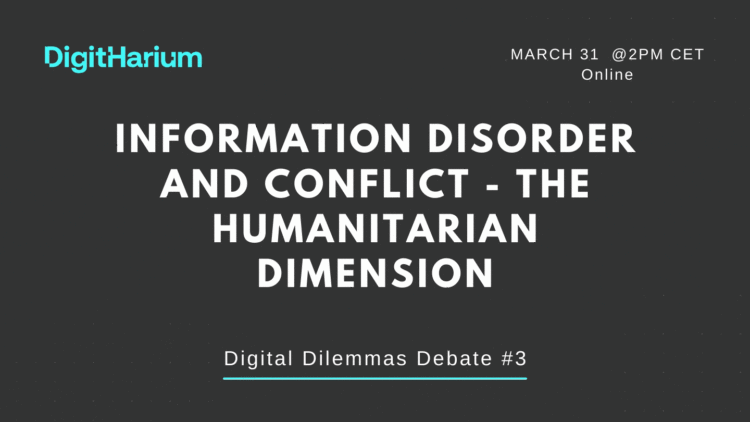31 March 2021 at 2pm – 3.15pm CET: Digital Dilemmas Debate #3: Information disorder and conflict – the humanitarian dimension
What are “information disorders”? What impact do they have on conflict and other situations of violence? And how can humanitarians better understand them and mitigate their negative effects?
Building on the third Digital Dilemmas Dialogue, we have called in experts from the humanitarian sector, civil society and academia to discuss how misinformation, disinformation and hate speech are affecting people affected by crises, conflict dynamics, and humanitarian operations. The debate will explore how humanitarian organizations can understand “information disorders”, their main drivers and their likely consequences, as well as how they can be addressed as part of broader protection and assistance programming.
The discussion will be the last event of the March thematic path – Misinformation, Disinformation and Hate Speech.
Series
The Digital Dilemmas Debates are a series of roundtable discussions between prominent experts and stakeholders from different sectors about the humanitarian digital transformation, its implications and the work ahead. Each month, they will explore a different type or trend in the technologies used to respond to various types of crisis, and offer reflections on what is coming next.
Speakers’ Twitter handles:
- DigitHarium: @DigitHarium
- Sanjana Hattotuwa: @sanjanah from @ict4peace
- Meghann Rhynard-Geil: @GeilMeghann from @Internews
- Nathaniel Raymond: @nattyray11 from @JacksonYale
- Cynthia Lee: @cyn_mondiale from @ICRC_SSudan
- Stuart Campo: @stucampo from @humdata
Background
- Propaganda and the manipulation of information have always been part of the conflict landscape. In a digital world, this reality takes new dimensions as the Internet and social media exponentially increase the speed, scale and reach of – good and bad – information, increasing the magnitude of the phenomenon and its negative consequences.
- In the last years, the ICRC made significant efforts to better understand the opportunities and risks that digital technologies bring to people affected by conflict and violence. One of our key findings and working assumption is that the rapid evolution of digital information technologies is turning MDH into a key driver of conflict dynamics, violence, and harm – and an area of growing humanitarian concerns. The COVID crisis further highlighted the devastating effects of the global ‘infodemic’ threatening international peace and security. In short, MDH matters.
Why it matters
- MDH can contribute directly or indirectly to humanitarian consequences affecting civilian populations. MDH may increase peoples’ exposure to risks and vulnerabilities and can lead to physical harm – for example, when online hate speech incites violence against a minority group. It may also contribute to psychological and social harm through online/offline harassment, defamation and intimidation – which can, in turn, lead to persecution, discrimination or displacement. While causal relationships are particularly difficult to demonstrate, these phenomena are increasingly influential in humanitarian settings.
- Certain uses of MDH can violate IHL and other rules of international law. The use of propaganda, mis- or disinformation during armed conflict is not prohibited under IHL, but certain forms of MDH can violate specific IHL rules and raise questions around accountability and attribution of responsibility in the digital space. MDH therefore ought to be part of the ICRC’s considerations in the context of its dialogue around conduct of hostilities and other protection issues.
- MDH can jeopardize the acceptance and trust in humanitarian organisations. False and manipulated information can cause reputational damage, erode trust and undermine communities’ acceptance of humanitarian organisations, including the ICRC. This can have negative consequences on programmatic and operational capacities, further restricting the space for NIIHA and potentially leaving affected people’s needs unattended.
- MDH can also lead to security issues such as threats or attacks against humanitarian staff. An organisation or its employees can be the target of MDH through defamatory social media campaigns. Such online attacks can be planned, politically motivated or unfold in a more organic manner as the result of a misunderstanding, or serious discontent with a behaviour, service or response provided by a humanitarian organisation. This is a trend that needs to be understood and monitored for strategic purposes and as a matter of due diligence.

